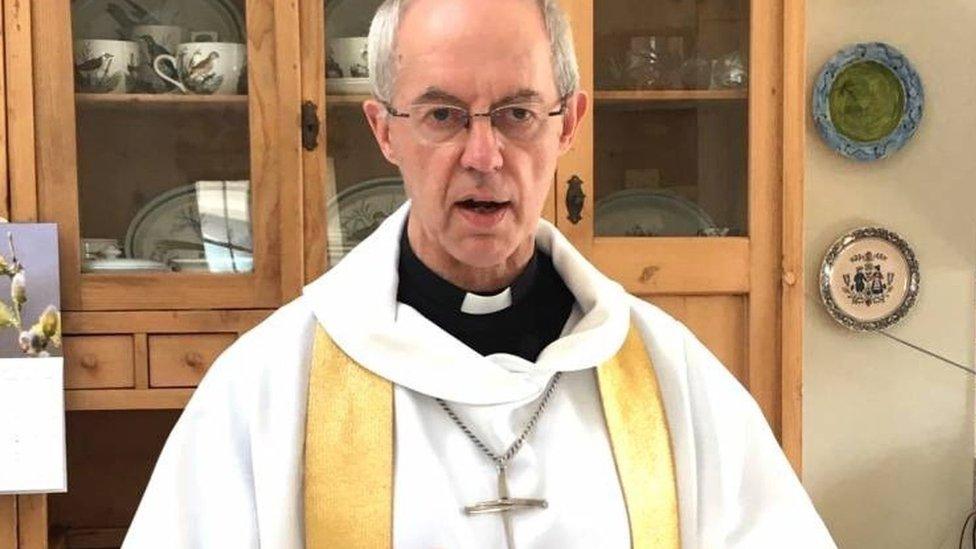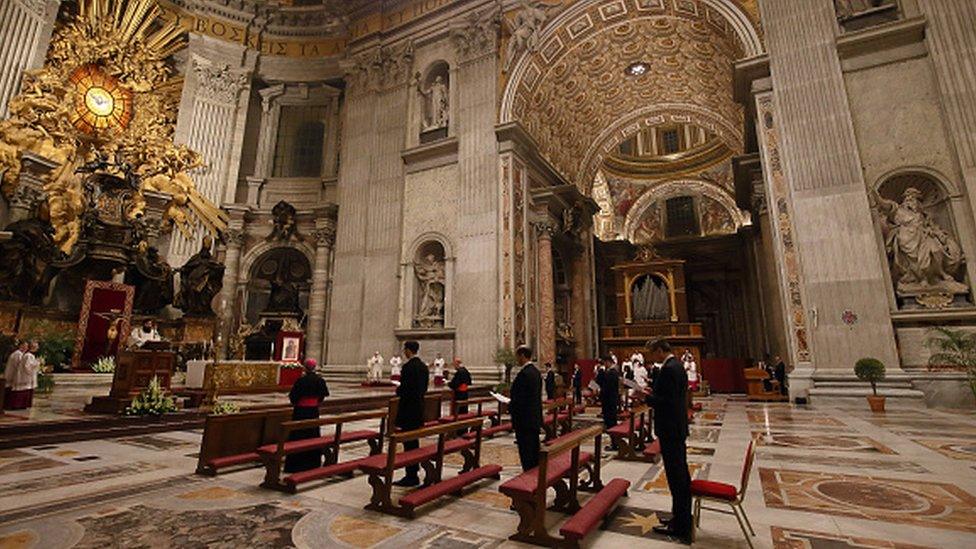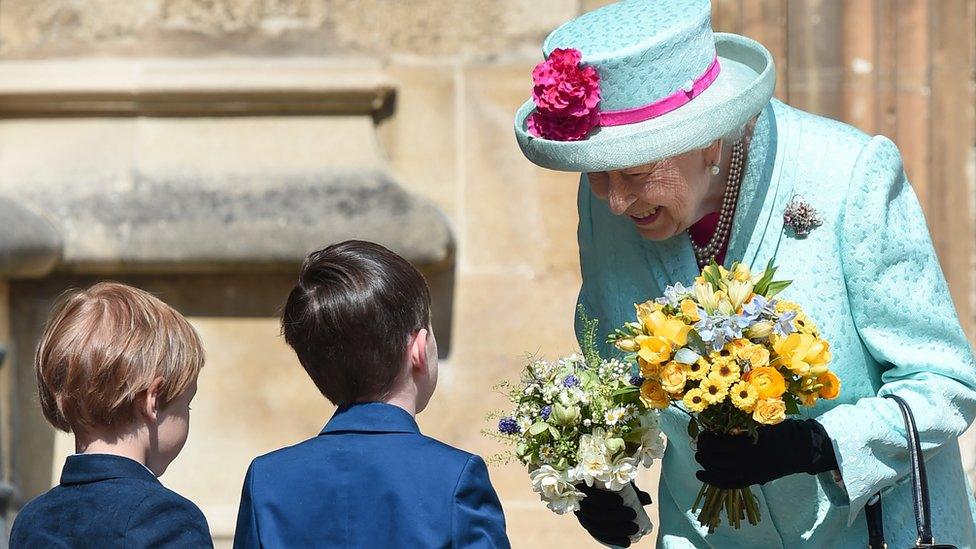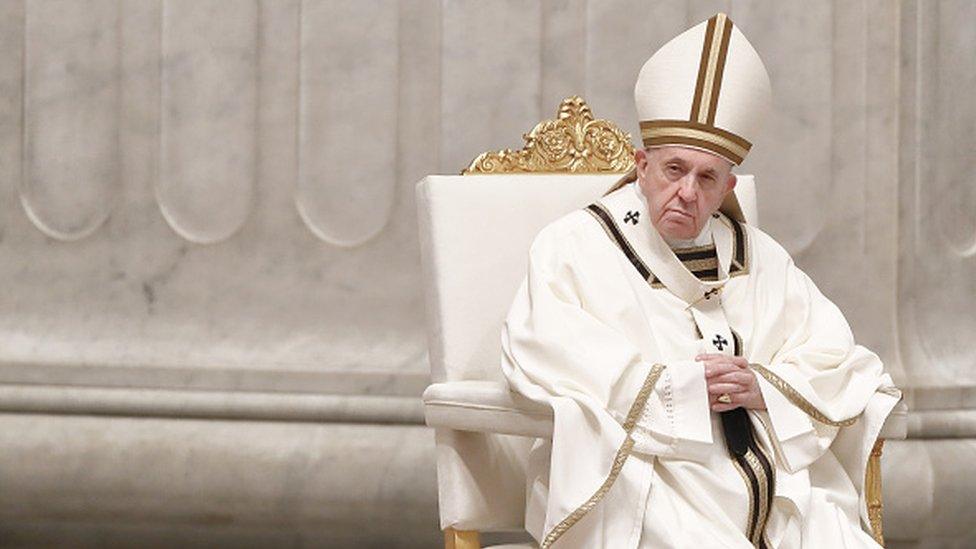Coronavirus: Archbishop of Canterbury praises 'heroism' of key workers in Easter sermon
- Published

Archbishop Welby recorded his Easter Sunday sermon from his kitchen
The Archbishop of Canterbury has hailed the "heroism" of front-line workers during the coronavirus outbreak, as UK churches remain closed over Easter for the first time in hundreds of years.
Justin Welby led the first national digital Easter Sunday service from his kitchen at Lambeth Palace.
Meanwhile the Archbishop of Westminster has highlighted how faith can be a comfort "in a time of darkness".
With the UK under lockdown, worshippers are marking the festival from home.
It comes as the number of coronavirus deaths in UK hospitals reached 9,875.
In a video from his flat in central London Archbishop Welby called for "a resurrection of our common life".
"After so much suffering, so much heroism from key workers and the NHS, we cannot be content to go back to what was before as if all is normal," he said in the sermon recorded on his iPad.
"There needs to be a resurrection of our common life."
The service was broadcast live on BBC Radio 4 on Sunday and is available to watch on the Church of England's website and Facebook page.
The BBC's Andrew Marr asked the archbishop what it was like to deliver an Easter sermon from his kitchen
The Archbishop normally presides before a congregation of 1,500 people at Canterbury Cathedral on Easter morning.
However, all traditional Easter services have been cancelled to follow the government's rules on social distancing.
A message posted from Prime Minister Boris Johnson's Twitter account wished the country a happy Easter.
"This year across the country churches will remain closed and families will spend the day apart," the message said, external.
"But by staying home, remember, you are protecting the NHS and saving lives".
'You are not alone'
Archibishop Welby told a virtual congregation: "So many people right across the country are anxious about employment, food, are isolated from loved ones and feel that the future looks dark."
"People right across the globe feel the same uncertainty, fear, despair and isolation. But you are not alone."
He added: "In the resurrection of Jesus Christ, we have a hope that is surer than stone; than any architecture.
"Even in the dark days of this Easter we can feed on hope. We can dream of what our country and our world will look like after the pandemic."

A SIMPLE GUIDE: How do I protect myself?
AVOIDING CONTACT: The rules on self-isolation and exercise
HOPE AND LOSS: Your coronavirus stories
LOOK-UP TOOL: Check cases in your area

Meanwhile, the leader of the Roman Catholic Church in England and Wales, Cardinal Vincent Nichols, said the Easter break was a chance to reflect, in a sermon broadcast on 39 BBC local radio stations.
"This time of great testing enables us to distinguish what is truly important from all that is fleetingly desired, and has so often mistakenly been given pride of place in our ambitions," he said.
"Already we have to look forward to the rebuilding of our common life."
Cardinal Nichols also pointed to the Easter story to show that "death is not the last word" and to urge families to seek comfort and courage in Jesus Christ.
"So often it seems that death does have the final say, breaking our hearts, especially when the departing one is far from our arms," he said.
"Then, as for many today, death is ruthless, uncompromising, hard as rock.
"Today we proclaim another reality: death is not the end. The rock of suffering and death is broken open by the cross of Jesus."

The Pope's Easter vigil service was attended by only a couple of dozen people
The Pope will also break with tradition and livestream his Easter Sunday mass from a mostly empty St Peter's Basilica in Rome.
In an Easter vigil service on Saturday evening, the leader of the Roman Catholic Church urged people not to "yield to fear" over coronavirus, calling on them to be "messengers of life in a time of death".
It comes after the Queen told the nation "coronavirus will not overcome us", in an Easter message on Saturday.
Referencing the tradition of lighting candles to mark the occasion, she said: "As dark as death can be - particularly for those suffering with grief - light and life are greater."
- Published11 April 2020

- Published12 April 2020
